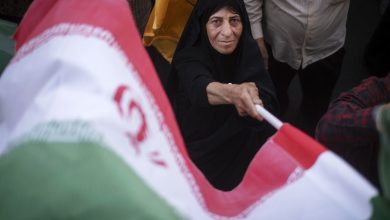Hubert Davis Brings Out North Carolina’s Toughness at the Garden
The night before Hubert Davis brought his University of North Carolina men’s basketball team to Madison Square Garden for the first time as a head coach, he showed his players video from a pair of seminal moments from his playing days with the rough and tumble 1990s Knicks: a full-scale melee with the Phoenix Suns and another with the Chicago Bulls that carried into the stands and almost into the lap of David Stern, then the N.B.A. commissioner.
“I told them I don’t want you to get into a brawl, but I just wanted to let you know the experience that I had here,” Davis said of those tinderbox days at the Garden, when the game was far closer to a steel cage match than a night at the ballet.
If there was a message — that the Tar Heels would need to fight (metaphorically, at least) for rebounds, dig in on defense and muscle their way to their spots on offense against a young but physical Ohio State team — it largely went unheeded Saturday when North Carolina, which had fallen behind by 14 points in the first half, trudged to halftime trailing by 9.
Then Davis was more direct.
“Coach just called us soft,” said Armando Bacot, the Tar Heels’ senior center. “In the first half, we were getting punked. We were giving up a lot of offensive rebounds and they were doing what they wanted to do. In the second half, we wanted to lock in and throw some punches.”
The Tar Heels found enough resolve — and a dollop of intervention from Pete Nance’s buzzer-beating jumper off an inbounds play at the end of regulation — to deliver an 89-84 overtime victory that carried with it a sigh of relief through the locker room like a December zephyr.
“We kind of needed that,” said RJ Davis, a junior point guard.
The game — tense, physical and with many turns — was an exquisite undercard at Madison Square Garden, preceding U.C.L.A.’s methodical disassembling of Kentucky, 63-53, on Saturday night.
If the atmosphere at the Garden wasn’t quite as raw as the Big East tournament semifinals on a Friday night in March, it was still lively with North Carolina and Kentucky fans — including Yankees General Manager Brian Cashman sitting courtside — making up most of the crowd of 20,261.
The Garden was the epicenter of what felt like a day of taking stock in college basketball. Houston won at Virginia, Gonzaga got past Alabama, Kansas throttled Indiana and Arizona survived a visit from Tennessee in a batch of intersectional games that figure to carry weight for the N.C.A.A. tournament selection committee.
There is much ground to cover, though, before March.
It is hard to find a team for which that distance will feel like more of a slog than North Carolina, which returned almost its entire cast from last season when it perhaps came within a cruel twist — a turn of Bacot’s ankle in the waning moments of the championship game against Kansas — of winning the national title.
The Tar Heels began this season ranked No. 1, until they lost four in a row and became the earliest preseason favorite to exit the rankings in more than 50 years.
“It’s not easy; expectations are crazy,” said U.C.L.A. Coach Mick Cronin, who found himself in a similar circumstance a year ago. The Bruins squeaked into the N.C.A.A. tournament in 2021, just as North Carolina did last season, and lost in devastating fashion in the Final Four, on a halfcourt shot by Gonzaga’s Jalen Suggs.
Cronin returned his entire rotation last season — and added two role players — but the Bruins, who began last season ranked No. 2, never quite found that same level and were bounced from the tournament by North Carolina in a regional semifinal.
“I felt like last year my thing was, we were — you can’t just wait until March like we’re going to come back and try and win it,” Cronin said. He added: “It’s just human nature. It’s not that the kids don’t care. It’s not that they don’t try, but it’s kind of like, ‘We want to get back.’”
In Cronin’s estimation, in programs like his — or at North Carolina, Kentucky or any of the other basketball elites — it’s rarely a question of having enough offensive talent, but of doing the uncomfortable things that separate the best teams from merely the most talented.
“You’ve got to eat your vegetables,” he said.
The Bruins may have required an extra helping of spinach against Kentucky center Oscar Tshiebwe, who managed just 8 points but grabbed 16 rebounds and drew seven fouls, and got so little help from his teammates that it conjured up memories of last season’s tournament flameout against St. Peter’s.
It was clear how much the game meant to the Bruins when Jaylen Clark roared after a late breakaway dunk, when Tyger Campbell spiked the ball when the buzzer sounded and when the Bruins high-fived a pocket of their fans as they bounced off the court.
U.C.L.A.’s Jaime Jaquez Jr., who carried his team with 19 points, 12 rebounds, 4 assists and 4 steals, had circled the game when the schedule came out, as much for the setting as the opponent.
“The city is amazing,” said Jaquez, who grew up in Camarillo, Calif., but whose only sports memory in a handful of visits to New York was watching one of Mariano Rivera’s final games at Yankee Stadium. “Every time I come is always an adventure.”
Players from far and near seemed to relish the experience.
Just as enthralled was RJ Davis, the North Carolina guard, who grew up north of the city in White Plains, N.Y. He won a state championship at Archbishop Stepinac High School, but playoff games were played at Fordham and St. John’s.
“I couldn’t lose in my own city,” said Davis, who hit four clinching free throws in overtime and a critical 3-pointer among his 21 points, 8 rebounds and 4 assists. “I’ve loved watching the games here ever since I was a kid; it’s the mecca.”
The day was not without its moments for another pair of locals. Ohio State’s Zed Key, a junior forward from Bay Shore, N.Y., hit a 3-pointer with 30 seconds left to put the Buckeyes ahead. And U.C.L.A.’s Mac Etienne, who grew up in Manhattan, played a useful 13 minutes by picking up five rebounds.
The day, though, belonged mostly to Nance, the graduate transfer from Northwestern and the only new component of the North Carolina rotation. If his father, Larry Nance, and his brother, Larry Jr., have their own Garden memories from the N.B.A., he has one, too.
It looked grim for North Carolina after the Ohio State freshman Brice Sensabaugh’s jumper in the lane had put the Buckeyes ahead, 79-77, with two seconds left in regulation.
North Carolina called a timeout, and Leaky Black fired a pass to midcourt to Davis, who called another timeout with 1.2 seconds left. That set up a more delicate pass from Black, who lofted the ball to the other side of the lane to Nance, a play they had never practiced. “I used to play a little quarterback back in the day,” Black said with a smile.
Nance gathered the ball, wheeled and lofted a turnaround 18-footer that left his fingertips with one-tenth of a second left. The ball settled through the net to tie the game, bringing the Garden to its feet. It gave the Tar Heels a chance at redemption in overtime — and a taste of what lies ahead in the distance of a college basketball season.



